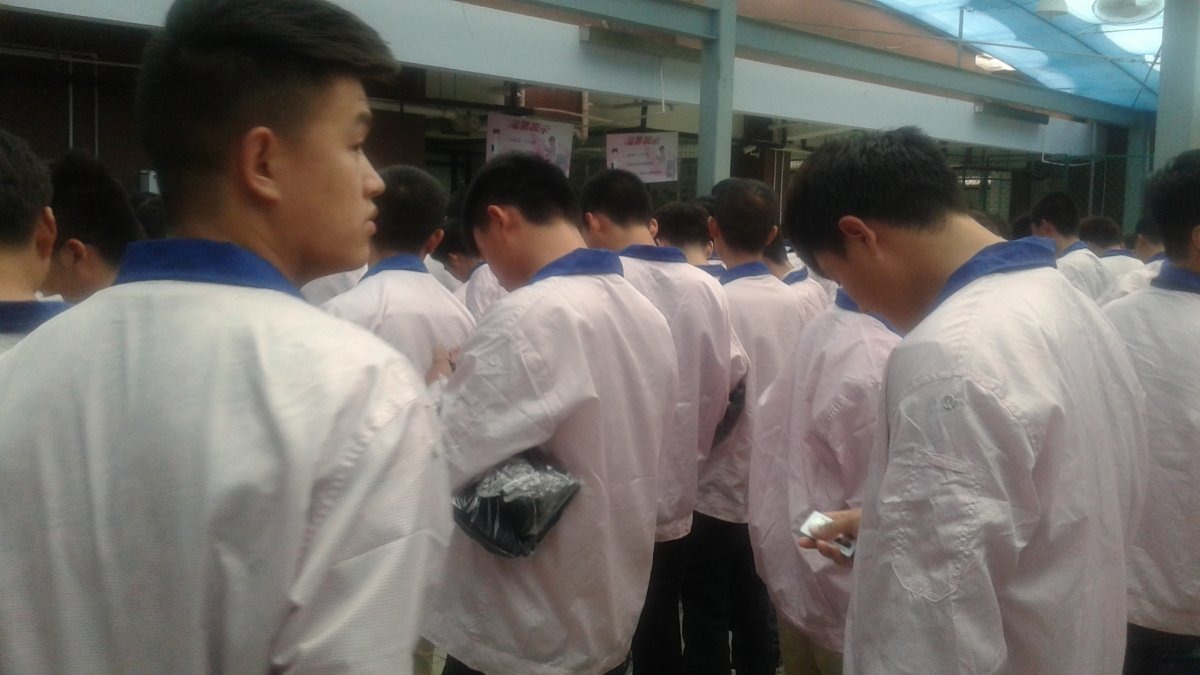In an interview published on Tuesday, a New York University graduate student described working at a Pegatron factory near Shanghai last year as a summer project, where he assembled the iPhone 6s and later the iPhone 7.
While the Q&A session with Dejian Zeng, conducted by Business Insider, revealed little in the way of new information, it did offer a few interesting tidbits about Apple's process of prepping a new iPhone model for manufacturing.
As previously outlined in numerous China Labor Watch reports, Zeng's job involved repetitive, boring work. Initially, Zeng was tasked with fastening an iPhone 6s speaker to its housing with a single screw, repeatedly, over the course of 12-hour shifts. When he was switched to iPhone 7 work in August, his job switched to fastening a camera cowling using two screws.
Zeng noted that when the iPhone 7 went into trial production he would sometimes have nothing to do for hours, only churning out a handful of phones in an entire day. Security, meanwhile, ramped to severe levels, with two security checks plus increased metal detector sensitivity, even forcing women with wire bras to change their clothes.
During iPhone 7 production, Apple staff — referred to as "the client" by Pegatron staff — were on the floor to monitor the process, and factory management are said to have turned the assembly line into a virtual "clean room."
Zeng noted that he only earned $450 per month, with unpaid breaks and effectively mandatory overtime. Most people on the floor couldn't afford iPhones, and so used local Chinese smartphones instead — important, since they were required to use a special Apple-promoted app with training documents and overtime information.
Pegatron itself is said to have offered two days of training, mostly focused on safety, and indeed kept an eye out for safety problems after the fact as well as underage workers.
An Apple spokesperson told BI that the company has staff at the Pegatron factory every day, and performs audits to keep weekly overtime under 60 hours, the average allegedly being 43. Wages are claimed to have grown more than 50 percent in the last five years, passing Shanghai's minimum wage.
Apple audits of Pegatron operations purportedly found 99 percent compliance with the 60-hour limit. Zeng complained, however, that workers do sometimes put in more than 60 hours, and that people barely get enough time for rest, much less some of the training programs they're offered that would allow them to pursue a less grueling career.
 Roger Fingas
Roger Fingas







-m.jpg)






 Charles Martin
Charles Martin

 Malcolm Owen
Malcolm Owen
 William Gallagher
William Gallagher

 Christine McKee
Christine McKee
 Wesley Hilliard
Wesley Hilliard








36 Comments
2 words: Ro. Bots.
I used to work for Mercedes-benz, I could not and cannot afford a new one. Were they not paying me enough?
This is a china problem, not an Apple problem. I am not even sure Apple determines how much people can make at these factories, factories that make products for Samsung, Microsoft, google and the likes I might add.
I would sincerely like to know how much Oppo and Xiaomi, and Huawei pay their workers.
Spies... the most honorable and respectable people in the world i guess ha... .... holier than thou , save the world type.. who have no clue of the bigger picture.... and take pride in stupid shortsighted comments . .. Zeng ... get a clue... do u even have and idea how those workers lived before they had access to these jobs.... moron ! to quote Z400racer37 from macrumors .
https://forums.macrumors.com/threads/nyu-student-goes-undercover-at-pegatron-factory-offers-inside-look-at-iphone-production.2041400/#post-24487755